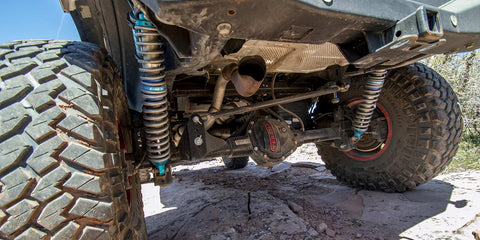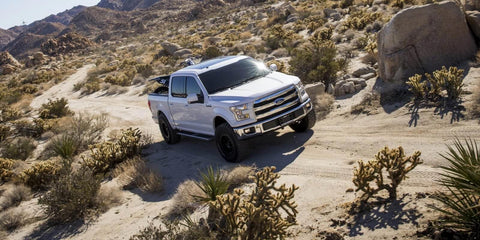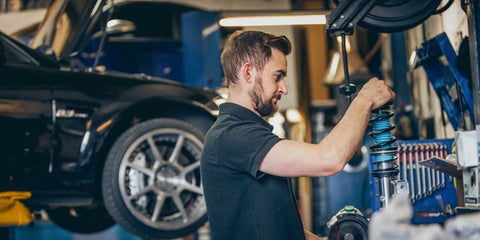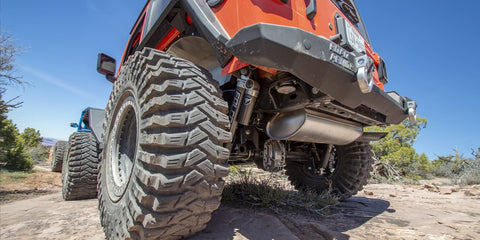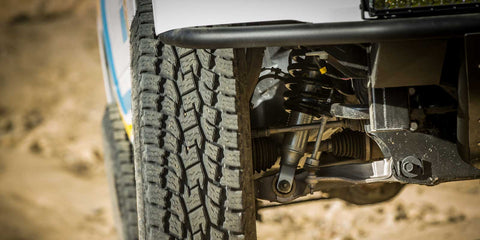Bilstein vs. Eibach Shocks: What Sets Them Apart?
Posted by Sean Reyes on
Eibach manufactures its own shocks in-house in California, with custom valving that delivers a noticeably different feel compared to Bilstein's 5100 series on similar vehicles. Through extensive testing and real-world use on our team’s vehicles at Shock Surplus, we’ve gathered hands-on insights about both brands.
Key Comparisons and Reviews
Overview of Bilstein and Eibach Shocks
Bilstein 5100 shocks maintain close alignment with factory specifications. They offer up to 2.5 inches of front-end lift for trucks, keeping within reasonable geometry limits. Eibach, in contrast, allows up to 3 inches of lift, sometimes pushing the limits of what’s practical, leaving users to address potential fitment issues.
Bilstein’s reputation leans toward a "sporty yet comfortable" ride, especially for those who appreciate precise handling. Their shocks provide tight control and responsiveness, making them a top choice for drivers prioritizing performance. Meanwhile, Eibach’s Pro-Truck shocks offer a softer ride with tuning that appeals to a broader range of drivers.
Build Quality and Durability
Both brands, with German roots, are committed to premium craftsmanship. They use high-quality seals and tight tolerances to ensure durability. While we haven't personally tested either shock to 100,000 miles, user stories confirm these shocks often last that long with proper care.
However, off-road use can shorten lifespan. Frequent temperature shifts and exposure to dirt will degrade any shock over time—no brand is immune to that.
Ride Quality: On-Road and Off-Road
On-Road Performance
Bilstein: Known for reducing body roll, nose dive, and rear-end bounce, Bilstein suits vehicles carrying heavy loads or towing.
- Huge difference between factory shocks, instant reduction in ‘slop’ for heavier vehicles.
- If you like your truck to feel more like a sports car, Bilstein is highly recommended.
Eibach: Offers a slightly softer ride, excelling over speed bumps and potholes.
- Drivers in our tests preferred Eibach for day-to-day comfort, though the difference in handling between the two brands was minimal in most scenarios.
- If a Bilstein is a 4/5 on the Sporty-Feel scale, then we would put Eibach Pro-Truck shocks at a 3. From the 3 vehicles we’ve done head to head comparisons against, every driver leaned towards Eibach in the comfort department. That means bump compliance over speed bumps, driveways, potholes were all a bit subdued.
Off-Road Performance
Bilstein: Provides a predictable, confident feel at higher speeds, excelling as you push harder off-road. However, it’s not ideal for those looking for a soft, scenic off-road ride.
Bilstein will still maintain the same attitude off-road as on-road, that sporty feel, great handling, you know where the suspension is at most of the time and the path of the vehicle is very predictable.
The faster you go, the smoother it gets. That’s how we like to describe a digressive shock off-road. In our opinion, the increased road feedback produces more confidence to keep smashing the skinny pedal - that says to us there’s more suspension travel to use. When you start to feel a little more float in the Bilstein shocks, thats when its good to settle in or let off.
Eibach: A bit softer and more forgiving on trails, making it a comfortable option for casual off-roaders. That said, we noticed more frequent bottoming out in some setups, like on the Ford Ranger, especially under hard hits.
While Eibach’s tuning approach produces a little more comfort on the trails and desert environments, there’s one drawback we noticed in the 2020 Ford Ranger. The Eibach seemed to hit bumpstops more often than Bilstein under faster speeds. So when the speeds ramped up, Bilstein produced more feedback, kept it tighter, and had better bottom-out protection in the harder hits.
Why is that? If your shocks are more linear, then its softer in the ride zone, so when a big compression event happens, the shocks have a lower baseline of force applied - this results in more travel.
Allowing the suspension to use more of its travel is generally a good thing, and most drivers of the Eibach setups agreed it felt more smooth overall when compared to the Bilstein. But we wanted to mention that there’s pros and cons to a softer suspension setup while off-road.
There were instances when performance was indistinguishable, and also when the handling gap was huge; particularly off-road.
With the 2022 Bronco, we tested the Bilstein 5100 with factory springs, before testing the Eibach Pro-Truck coilovers. Essentially it wasn’t a fair “comparison” - because Eibach doesn’t have stand alone shocks to test against the 5100s.
The 5100s on the Bronco felt like the softest Bilstein shock we’d ever ridden on, surprising all of us at Shock Surplus. And when compared to the Pro-Truck coilovers, it was a massive difference - with Eibach winning our vote for on and off-road use.
Conclusion: Which Shock is Right for You?
- Daily Driving Comfort: Eibach
- Towing or Hauling: Bilstein
- Mixed On and Off-Road Use: Eibach
- Overlanding: Bilstein









